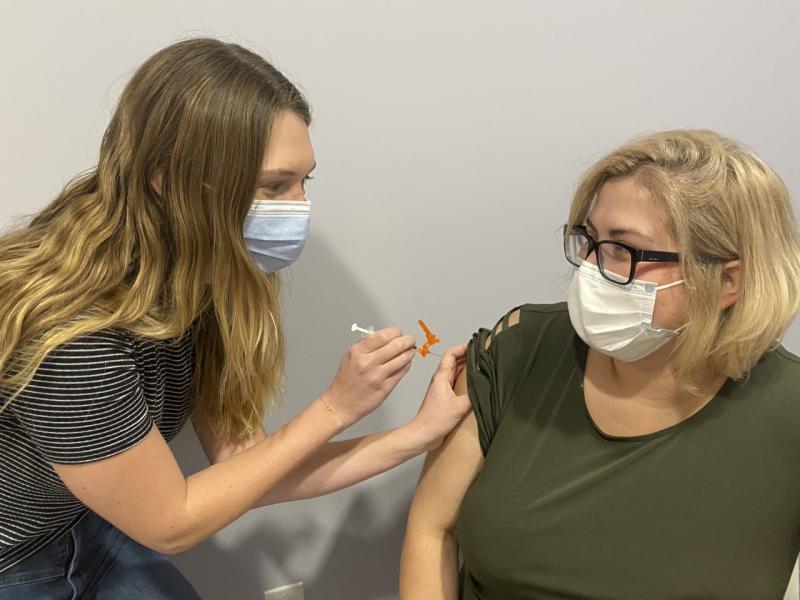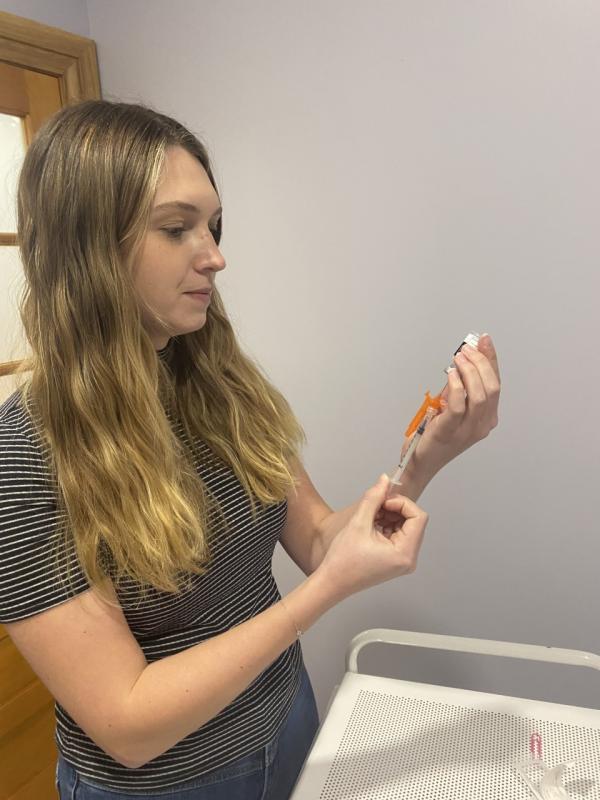Hannah Morley closing in on doctorate of pharmacy
 Hannah Morley, left, is on a college break from her rotation. She is working at Nathan’s Wellness Pharmacy and Apothecary in Boothbay Harbor giving co-owner Maria Jose Amor an inoculation. Courtesy photo
Hannah Morley, left, is on a college break from her rotation. She is working at Nathan’s Wellness Pharmacy and Apothecary in Boothbay Harbor giving co-owner Maria Jose Amor an inoculation. Courtesy photo
 Future pharmacist Hannah Morley is in her sixth and final year of the University of Rhode Island College of Pharmacy program. Courtesy photo
Future pharmacist Hannah Morley is in her sixth and final year of the University of Rhode Island College of Pharmacy program. Courtesy photo
 Hannah Morley, left, is on a college break from her rotation. She is working at Nathan’s Wellness Pharmacy and Apothecary in Boothbay Harbor giving co-owner Maria Jose Amor an inoculation. Courtesy photo
Hannah Morley, left, is on a college break from her rotation. She is working at Nathan’s Wellness Pharmacy and Apothecary in Boothbay Harbor giving co-owner Maria Jose Amor an inoculation. Courtesy photo
 Future pharmacist Hannah Morley is in her sixth and final year of the University of Rhode Island College of Pharmacy program. Courtesy photo
Future pharmacist Hannah Morley is in her sixth and final year of the University of Rhode Island College of Pharmacy program. Courtesy photo
On Feb. 27, 2016, Hannah Morley stood atop a ladder at the Augusta Civic Center, victoriously swinging the nets after Boothbay captured the Class C Girls Regional Basketball Championship. In June 2016, she graduated from Boothbay Region High School with aspirations of becoming a pharmacist. Morley is closing in on her career ambition as she is in the sixth and final year of University of Rhode Island’s College of Pharmacy program.
In May, she will graduate with a doctorate in pharmacy, then start a year long residency program. In choosing URI, she liked the pharmacy program because it offered two years of undergraduate education and four years of professional work. Morley recently completed a rotation at Maine Medical Center and was poised to return to school. Those plans changed after a global outbreak of the coronavirus’ omicron variant. URI responded by halting its on-campus education program.
Instead of returning to Rhode Island, Morley remained this winter in Boothbay. Her college advised Morley to further her education by either working or volunteering at a local pharmacy. She is working at Nathan’s Wellness Pharmacy and Apothecary in Boothbay Harbor. “It’s like an internship, but it’s not. I don’t receive school credit, but I do gain experience,” Morley said.
After graduating high school, Morley wanted to attend a big university, but not “too big.” She selected URI in Kingston, Rhode Island. Morley chose the southern New England school after a visit. She built a rapport with staff and all her classes were within walking distance. “I know it sounds cliche, but I said to myself, ‘I could see myself going to school here.’ It just checked all my boxes,” she said.
With college graduation approaching, Morley’s next step is applying for her one-year pharmacy residency. She is visiting pharmacies in search of a suitable residency location. Morley described the process as both parties seeing if the other is an appropriate match. “I don’t know where my residency will be. I will list my preferences and pharmacies will list their preferred applicants. I should know sometime in March.”
Once her one-year commitment ends, Morley is free to select where she’d like to work. “I’m not sure where I will end up. I’d like to live close to home, but I really haven’t thought much about it.”
Once her education ends, her obligation to repay her student loans begins. Morley estimated room and board at URI is over $40,000 per year. Since her degree requires a six-year program, she has more of a burden than most graduates.
Besides student loans, Morley’s education was paid through a Boothbay Region Student Aid Fund grant. Morley received a grant for all six years of her pharmacology education. Since 1964, BRSAF has provided grants, not loans, for up to six years of post-secondary education or training. The fund is available to all graduates and alumni. For Morley, the fund’s flexibility in allowing up to six years is appreciated.
She recently talked to her father, Andrew Morley, about her college loans. Morley told “Dad,” she was in good shape. “He asked me, and I told him, ‘I’m going to be fine,’” she said. “URI is not inexpensive, but I received assistance from the BRSAF which made my debt more manageable. The BRSAF having a six-year limit instead of four was a big help to me.”
In college, Morley learned how a pharmacist acts like a “second set of eyes” for patients. She recounted several experiences during the Maine Medical Center rotation where physicians would contact pharmacists seeking their input. “They received several calls about what kind of antibiotics should be prescribed and how it would interact with other medications,” she said. “Your sole purpose is making sure patients receive the appropriate medication. You are there to make sure what is prescribed makes sense.”
This article has been updated from its original posting.
























